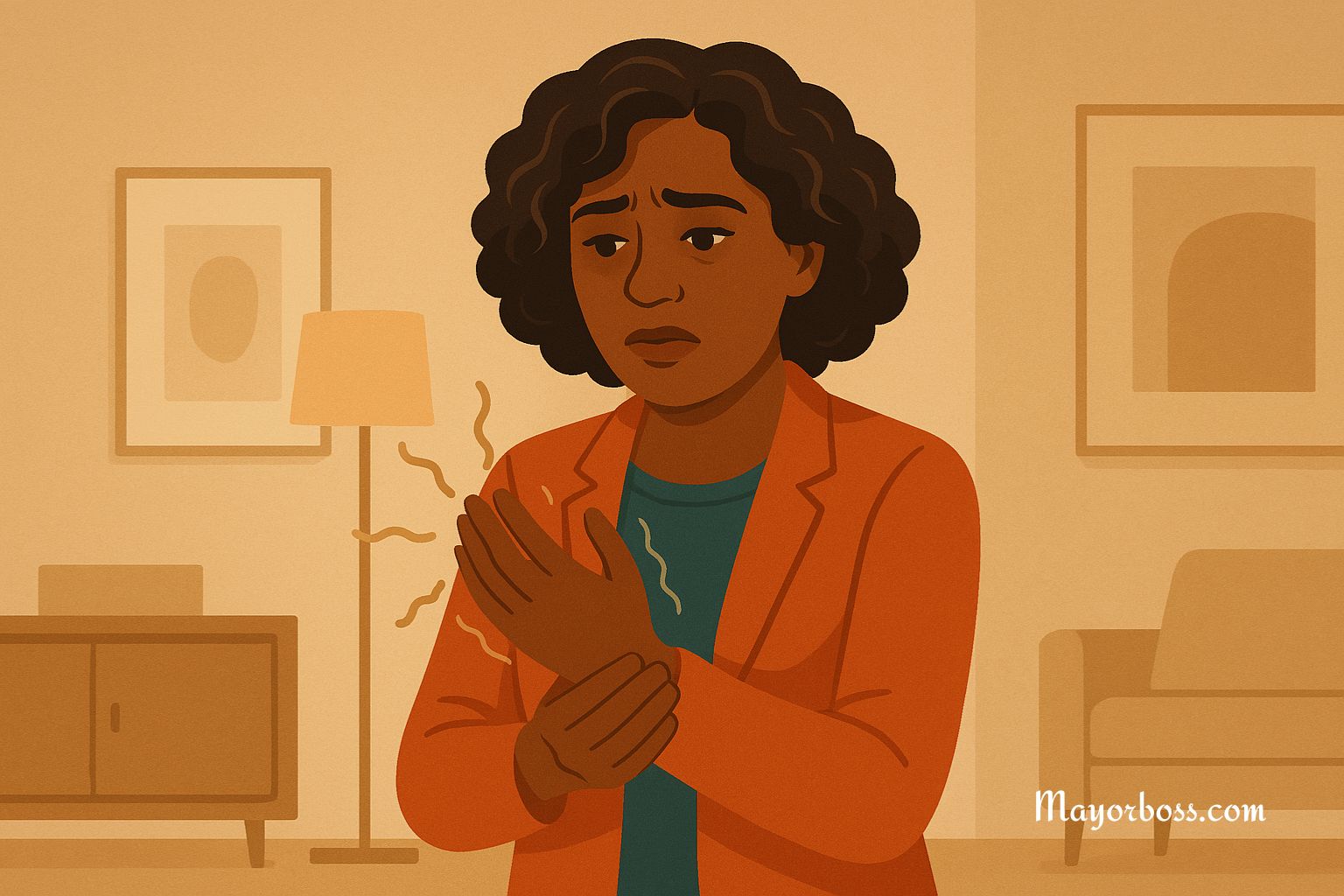Early Warning Signs That Cancer Is Growing In Your Body
I want to share with you vital information on some early clues that may indicate cancer is growing in the body. This knowledge could be life-saving because, in many cases, early detection can make treatment easier and more effective. Thanks to awareness and medical advancements, many people have successfully treated cancer.
My aim is to help you recognize the important signals your body might send when something is not quite right. Before we start, Cancer Research UK advises that you tell your doctor about any unusual symptoms.

Cancer is not just a single disease. Rather, it is the name for a group of over a hundred different conditions that can affect any part of the body. In essence, cancer begins when cells grow in an unusual way and develop into malignant (or harmful) tumors. These tumors can then invade healthy tissues and spread to other areas of the body through a process called metastasis.
One of the challenges with cancer is that some types may not announce themselves in obvious ways during the early stages. In many instances, a small tumor can remain silent for weeks or months before making itself known. On the other hand, certain cancers create unmistakable signs and symptoms even in their early phases. Because of these differences, it can be tricky to know if what you are feeling is simply fatigue from a busy day or a more serious problem. However, by staying aware of your body and following up on any warning signs, you can boost your odds of catching cancer early. Let us examine some common warning signs.
1. Unexplained Weight Loss
Losing a few pounds here and there can be perfectly normal, especially if you have changed your diet or started exercising. But when weight slips off for no clear reason, it can be a concern. Suppose you have not adjusted your daily meals or exercise habits, yet you notice you have lost 10 or 15 pounds in a short time. In that scenario, it is best to pay attention.
According to the American Cancer Society, unexplained weight loss of more than 10 pounds can be an early indication of cancers such as the pancreas, stomach, lung, or esophagus.
Cancer can spur weight loss by altering how your body uses nutrients. In some cases, growing tumors demand extra energy, which can lead to weight dropping off unexpectedly. Additionally, certain cancers can release substances that change your metabolism or reduce your appetite. If this goes on for several weeks without an obvious reason, it might be time to see your healthcare provider.
So when to worry? Weight fluctuation of a couple of pounds over weeks or months might not be concerning, but if you continue losing weight—and this occurs at a noticeable rate, such as 5% of your body weight over a few weeks—schedule a visit with your doctor.
2. Changes in the Skin
Your skin is the largest organ of your body and often offers the first glimpse that something inside might be amiss. Many people associate skin changes with conditions like rashes or allergies, but they can also indicate hidden growths underneath the surface.
Moles and Freckles
Most of us have a mole or freckle, and many remain harmless throughout our lives. Yet one critical sign of potential trouble is a change in a mole’s appearance. Keep an eye on the size, shape, and color of your moles. Use the “ABCDE” rule as a quick guide:
- A: Asymmetry – One half of the mole looks different from the other.
- B: Border – The edges are not neat and may appear ragged or blurred.
- C: Color – There may be several shades of brown, black, red, or blue in one mole.
- D: Diameter – The mole is larger than a pencil eraser.
- E: Evolving – The mole changes in size, shape, or color over time.
If you see anything unusual, consult a doctor or dermatologist. While many changes can be harmless, some could indicate skin cancer, like melanoma.
Other Skin Signs
Sometimes the skin can become darker, yellowish, or develop reddened patches. Also, itching or excessive hair growth can be signals that the body is under stress. If you notice persistent changes—especially if they do not go away or worsen—you should check with a healthcare professional.
3. Unusual Bleeding
No one likes the sight of unexpected blood, and for good reason: it can be a silent alarm that something is not functioning correctly within. Unusual bleeding can happen in various forms, such as:
- Blood in the stool: Might suggest problems in the digestive tract.
- Blood in the urine: Could point to issues in the kidneys or bladder.
- Coughing up blood: Might be related to lung or throat troubles.
- Unusual vaginal bleeding: Can indicate changes in the reproductive organs.
Tumors can erode blood vessels, which causes bleeding in areas where it should not normally occur. In some cases, small lumps or sores can form, leading to ruptures or minor leaks of blood. While a single event of odd bleeding might not mean cancer, repeated incidents certainly deserve a medical evaluation.
So when to seek help? If you observe blood in your stool, urine, or phlegm—especially more than once—call a healthcare expert. It might turn out to be something less frightening, such as hemorrhoids or a minor infection, but better safe than sorry.
4. Persistent Cough or Hoarseness
Almost everyone has experienced a cough now and then. This is often caused by allergies, a cold, or other minor illnesses. But if you have a cough that does not clear up, especially if it lasts more than two or three weeks, it might be best to look deeper into the cause. The same goes for a raspy or hoarse voice that lingers without clear reason.
A cough that brings up blood or thick mucus is another sign that calls for prompt medical attention. Similarly, if your voice becomes deeper or coarser, or if you experience pain when speaking, consider asking your doctor to check your throat or lungs. While it might turn out to be a typical infection, it could also be something serious like cancer of the lungs, larynx (voice box), or thyroid.
5. Lumps or Swelling
There are times when you might notice a lump on your body, such as a bump on your neck that was never there before, a strange growth under your armpit, or a firm area on your breast. Many lumps are benign, meaning they are not cancerous. Cysts, fibroids, and swollen lymph nodes can all present as lumps without being dangerous. Nevertheless, a suspicious lump that lasts more than a couple of weeks or keeps growing warrants attention.
Breast Lumps
Breast cancer is one of the most common cancers in women, and lumps in the breast area can be among the earliest signs. Regular self-exams help detect lumps or changes in breast shape, size, or color. Consult your doctor if you notice any dimpling of the skin, a newly inverted nipple, or sudden redness in the breast region. Men can develop breast cancer, too, although it is much less common.
Other Areas to Check
Lumps can appear in various areas: the neck, underarms, groin, or even behind the knee. If you come across a bump that does not go away, be sure to share this finding with your healthcare provider. They might do a simple test or imaging study to rule out any serious cause.
6. Changes in Bowel or Bladder Habits
Our bodily excretions may not be a favorite topic for casual conversation, but changes in bowel or bladder habits can signal internal trouble. While short-lived shifts might be caused by a small infection or a meal that disagrees with you, long-term changes call for a closer look.
Bowel Changes
- Persistent Diarrhea: Could suggest colon issues or an inflammatory condition.
- Chronic Constipation: Might be a sign of a blockage or narrowing within the intestines.
- Alternating Diarrhea and Constipation: Potentially signals an underlying condition affecting the colon.
Bladder Changes
- Frequent Urination: If you find yourself needing to visit the restroom unusually often, it might hint at changes in the bladder or prostate (for men).
- Painful Urination: Could be a bladder infection, but in some cases, it might be due to a tumor pressing on the urinary tract.
- Blood in Urine: As noted earlier, this is a red flag that should always be investigated.
If you observe changes that go on for more than a couple of weeks, talk to your doctor for further guidance.
7. Chronic Fatigue
We all feel tired at times. Life can be demanding, and staying up too late can leave us groggy. However, chronic fatigue—a deep, lingering tiredness that does not seem to go away even after proper rest—can be a warning sign. In certain cases, it could be due to cancer changing how your body produces and uses energy.
Cancer-related fatigue is often described as feeling utterly drained as if the smallest task requires an enormous effort. If you experience weariness that stops you from doing everyday activities, or if you wake up exhausted without any reason—such as lack of sleep, poor nutrition, or intense physical activity—this might be a signal worth investigating.
Other Causes
Keep in mind that fatigue could stem from many factors, like anemia, depression, or even dehydration. Because the signs can overlap, the best course of action is to let your doctor know what you are experiencing. They can run tests to see if cancer or another underlying condition might be the culprit.
8. Persistent Pain
Pain is your body’s alert system that something might need attention. Chronic or persistent pain—whether it is a headache that never subsides, bone aches that continue without improvement, or abdominal pain that lingers—should be evaluated.
Different Types of Pain
- Headaches: Recurrent headaches could be caused by various issues, such as stress or migraines, but if they become more intense over time or feel different from what you usually experience, it may be worth getting checked.
- Bone or Joint Pain: Aching in the bones can be due to repeated strain, arthritis, or injuries. But if you notice deep, unrelenting pain that does not improve with rest or normal remedies, talk to your doctor.
- Abdominal Pain: The tummy region is home to many organs, and pain here can be tricky to pinpoint. Persistent or unusual discomfort should not be ignored.
9. Fever or Night Sweats
Fevers generally tell us our body is warding off an infection like the flu or a cold. Yet some cancers also cause unexplained fevers, particularly if they involve the immune system, such as leukemia or lymphoma. Night sweats—that is, sweating so heavily that your pajamas or bedding become soaked—can also occur with certain cancers.
Cancer cells sometimes spark the immune system, triggering a low-grade fever that lasts for days or weeks. Or the cancer may generate chemicals that raise body temperature. While not every fever means you have cancer, one that lingers for no apparent reason deserves a medical evaluation.
10. Difficulty Swallowing or Persistent Indigestion
Swallowing involves a surprisingly complex process, so any persistent hiccup in that system can indicate trouble in the throat, esophagus, or stomach. For instance, if you feel as though food is getting stuck or you experience discomfort when you try to swallow, do not dismiss it.
Occasional heartburn or indigestion, especially after a large meal, is common. But if you suffer from persistent heartburn, burping, or pain in the upper stomach or chest area—particularly if it lasts more than a few weeks—seek your doctor’s advice. These problems might result from ulcers, acid reflux, or an infection, but in some cases, they could signal esophageal or stomach cancer.
11. Swollen or Tender Lymph Nodes
Lymph nodes are small, bean-shaped structures that help our bodies fight infections. You might have felt them get bigger when you had a cold or a sore throat. This swelling occurs because your body is battling germs.
Cancer can also cause lymph nodes to swell, especially in the neck, armpit, or groin area. When harmful cells migrate into the lymph nodes, these structures might become enlarged and tender. If you notice a swollen lymph node that does not lessen after a couple of weeks, it is a good idea to check it out.
12. Sores That Do Not Heal
Cuts or scrapes usually heal in a matter of days or weeks. Sometimes, though, you might have a sore that stubbornly remains or worsens. This situation can occur on the skin or inside the mouth.
Possible Causes
- Mouth Sores: White or red patches inside your mouth or on your tongue might be caused by irritation or infections, but they can also be linked to oral cancers.
- Skin Lesions: A lesion that scabs over, peels, or continues bleeding could point to skin cancer.
Monitoring any sore that does not heal is vital. Early discovery can save you from more extensive treatments down the line.
When to Visit the Doctor
You may wonder, “How long should I wait before seeing a doctor?” While minor issues can often clear up on their own, it is best not to ignore symptoms that last more than a couple of weeks. If you notice changes like unexplained weight loss, lumps, strange bleeding, persistent pain, or new skin changes that persist, do not hesitate to schedule an appointment. Remember: catching cancer early can greatly improve the success of treatments.
Tips for Communicating with Your Doctor
- Keep a Symptom Journal: Make notes of any shifts in your body, including when they started and how severe they are.
- Bring a List of Medications: This includes vitamins, herbs, or over-the-counter drugs you regularly take.
- Ask Questions: Make sure you understand any tests your doctor orders and what they are looking for.
- Be Honest: Provide a clear picture of your habits, including diet, exercise, and any changes in your day-to-day routine.
Additional Measures to Protect Your Health
While no sure way exists to prevent all cancers, simple lifestyle steps may reduce your risk:
- Avoid Tobacco: Smoking and using tobacco products are linked with many types of cancer.
- Healthy Diet: Foods packed with fruits and vegetables contain antioxidants and vitamins that may help prevent certain cancers.
- Stay Active: Frequent exercise can support overall well-being and maintain a healthy weight.
- Moderate Alcohol: Heavy drinking has been linked to several types of cancer. Limiting intake can lower that risk.
- Sun Safety: Wear sunscreen and limit sun exposure to protect your skin from harmful UV rays.
- Regular Checkups: Screenings for breast, colon, and other common cancers can catch issues earlier.
Final Word
With this information in hand, you now have a better sense of what to watch for when it comes to early warning signs that cancer may be growing in your body. Remember, however, that these signs do not always mean you have cancer, and only a medical professional can run the proper tests to give a firm diagnosis.
Pay close attention to any changes or irregularities you notice. If something feels unusual, trust your instincts and seek medical advice.






